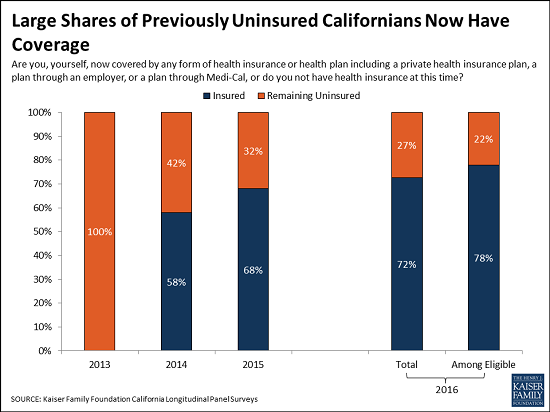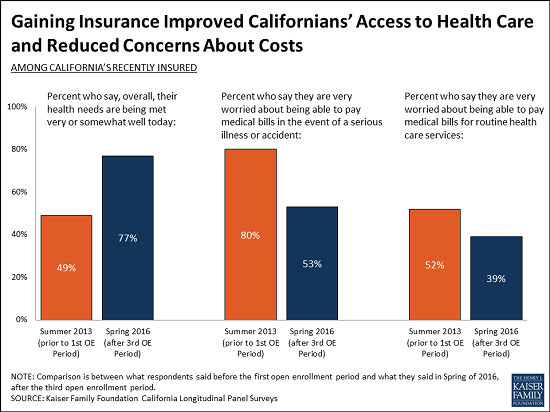
The independent source for health policy research, polling, and news.
New Survey Finds 72% of Previously Uninsured Californians Now Have Coverage, Including 78% of Those Eligible for New Affordable Care Act Options
Recently Insured Residents Report Greater Health and Financial Security, Though Worries about Health Care Costs and Access Persist for Some
For Remaining Uninsured Residents, Cost and Immigration Status Are Main Obstacles
Three years after the Affordable Care Act’s coverage expansions were fully implemented in California, nearly three quarters (72%) of the state’s previously uninsured residents now have health coverage, finds the fourth Kaiser Family Foundation Longitudinal Panel Survey, which is tracking the experiences of a randomly selected group of Californian adults who were uninsured in 2013. This is similar to the share who reported having insurance last year (68%).
The share with coverage is even higher (78%) among those likely eligible for Medi-Cal and private insurance purchased through Covered California, but unchanged from last year. Undocumented immigrants are not eligible to sign up for either type of coverage.
The four waves of the survey provide a detailed look at how the health and financial security of previously uninsured residents have changed in a state that fully embraced the Affordable Care Act’s opportunities to expand coverage, including creating the Covered California insurance marketplace and expanding its Medi-Cal program.
Reflecting the low incomes reported by many previously uninsured California, the largest share of recently insured residents are covered through Medi-Cal (33%), the state’s Medicaid program. The state’s marketplace, Covered California, covers about one in 10 (11%), a fifth (21%) now report employer coverage, and the rest report other sources of coverage. This new coverage likely reflects a variety of factors, including: the impact of the ACA’s new coverage options and requirements for individuals to obtain coverage and for large employer to offer it or pay penalties; a growing economy; and the regular churn of people in and out of coverage.
Overall, recently insured Californians are more likely to report that their health needs are being met today than when they were uninsured in 2013 (77% now versus 49% in 2013) and less likely to say they are very worried about paying medical bills. Californians who remain uninsured show less improvement on these and other measures of financial security and are worse off than the recently insured.
Of the recently insured, eight in 10 (79%) say their experiences with their current health insurance plan have been positive, including nearly a third (31%) who say their experiences have been very positive. Far fewer (15%) say their experiences have been negative, including just 5 percent who say very negative. Most of the recently insured also report that they are either very or somewhat satisfied with their plan’s choice of hospitals (81%), primary care doctors (76%), and specialists (68%).
At the same time, the survey finds that some recently insured Californians continue to worry about health care costs and access. For instance, one in five (20%) say they did not get medical care at some point in the past year due to cost, and more than half (53%) say they are very worried about paying medical bills in the event of a serious illness or accident, which is similar to the shares in other Foundation surveys of people with insurance nationally.
Similarly, one quarter (25%) of the recently insured say they have had to wait longer than a reasonable time to get an appointment for medical care, and 12 percent say they have been told by a doctor’s office or clinic in the past 12 months that they would not be accepted as a new patient.
While seven in 10 of California’s previously uninsured residents had gone at least two years without coverage prior to 2013, the majority now report stable coverage with nearly two thirds (63%) reporting having coverage for at least a year, including nearly half (48%) who report coverage for two or three years. Far fewer (14%) have unstable coverage, gaining it at some point, then losing it, and in some cases gaining it again.
In spite of the gains in coverage, the survey finds slightly more than a quarter (27%) of previously uninsured Californians are still without coverage. This includes 10 percent who are likely undocumented immigrants and ineligible for Medi-Cal or Covered California, leaving 17 percent who could potentially be helped by the law’s coverage expansions.
Hispanics make up two thirds (67%) of the remaining uninsured, though half of them (33% of all remaining uninsured) are likely undocumented immigrants who are not eligible for Medi-Cal or to enroll in Covered California. (Eligible Hispanics obtained coverage at rates similar to whites.)
When asked to say in their own words the main reason why they do not currently have health insurance, nearly half of the remaining uninsured (47%) say it is because health insurance is too expensive and they can’t afford it. Fewer cite eligibility issues (19%), including immigration concerns (10%). Just 2 percent cite opposition to the health care law as their main reason they don’t have coverage.
About The Survey
The survey is the fourth in a series based on the Kaiser Family Foundation California Longitudinal Panel Survey Project. It was designed and analyzed by researchers at the Foundation. The fourth and final wave of the survey was conducted primarily by telephone from February 10-June 20, 2016, among 1,001 individuals who had participated in the baseline survey. The baseline survey was conducted from July 11-August 29, 2013 with a representative sample of 2,001 adults ages 19 to 64 living in California who reported having been without health insurance for at least two months at the time of the survey. Interviews were carried out in English and Spanish by SSRS, an independent research company. The panel survey estimates the percentage of the previously uninsured who gained coverage and does not estimate the overall change in the number of uninsured Californians because it does not include anyone who may have been insured prior to open enrollment but is now uninsured. The margin of sampling error including the design effect is plus or minus 5 percentage points for results based on the full sample and for recently insured Californians, and 9 percentage points for those Californians who remain uninsured. For other subgroups, the margin of sampling error may be higher. Fieldwork for the panel survey is supported by a grant from The California Endowment.

